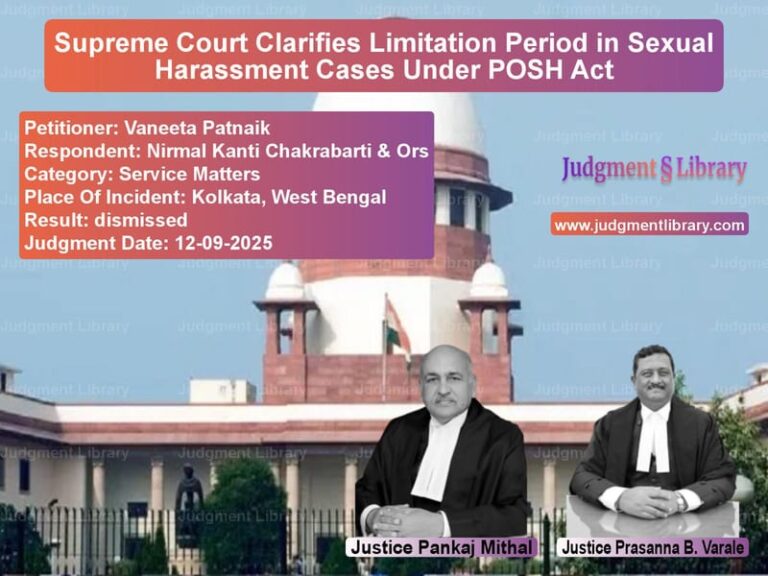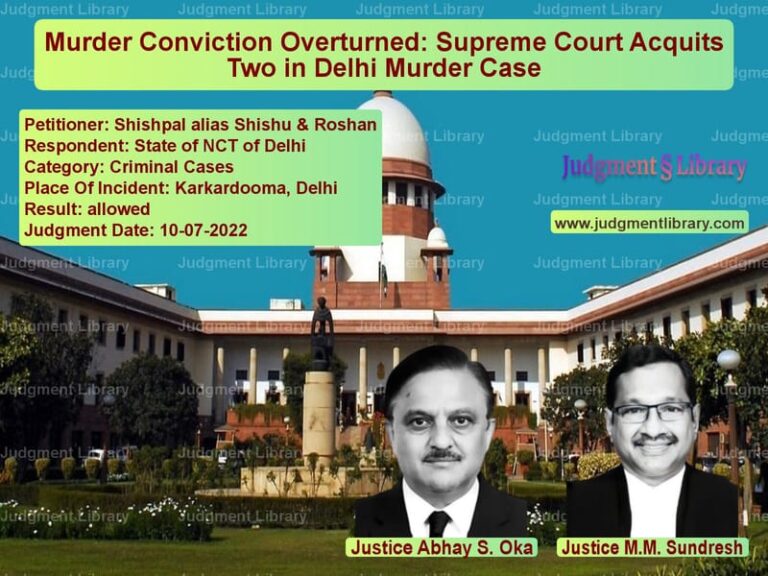Supreme Court Rules on Recruitment Rules: Equating Posts of Principal and Joint Chief Inspector of Factories
The case of Union of India & Ors. vs. S. Maadasamy & Anr. revolves around the challenge to recruitment rules that equated the post of Principal, Group ‘A’ (Senior Scale) with that of the Joint Chief Inspector of Factories (JCIF) in the Government of Puducherry. The Supreme Court examined whether the amendment in recruitment rules was justified and upheld by administrative principles.
The High Court of Madras had earlier dismissed the writ petitions filed by the Union of India, affirming the Central Administrative Tribunal’s (CAT) decision that quashed the amended recruitment rules. The Supreme Court reversed this ruling, holding that the amendment was a valid policy decision based on administrative exigencies and should not have been interfered with.
Background of the Case
The respondent, S. Maadasamy, initially joined government service as a Craft Instructor in the Labour Department on November 3, 1975. He was later promoted to Group Instructor, then to Inspector of Factories in 1982, and subsequently as Principal, Group ‘A’ (Junior Scale) in 1989. He was promoted as JCIF in 2001.
The controversy began when another officer, P.S. Krishnamurthy, who was promoted as Principal, Group ‘A’ (Junior Scale) after Maadasamy, challenged Maadasamy’s promotion. Based on Krishnamurthy’s representation, the government initiated a review of the promotion but faced opposition from the Union Public Service Commission (UPSC). Subsequently, in 2003, Maadasamy was transferred from JCIF to Principal, Group ‘A’ (Senior Scale), a move he challenged before the CAT.
Petitioner’s Arguments
The Union of India, represented by its legal counsel, argued:
- The challenge to the recruitment rules should have been limited to the equation of the two posts and not the entire set of rules.
- The recruitment rules were amended after due consultation with the UPSC, and the UPSC had concurred with the changes.
- Both JCIF and Principal, Group ‘A’ (Senior Scale) posts had identical educational qualifications and feeder posts, justifying their equivalence.
- The High Court and the Tribunal failed to consider that the UPSC had deliberated on the matter extensively before giving its approval.
- The government had the discretion to equate posts based on administrative requirements and should not be subjected to judicial review unless there was a fundamental violation of rights.
Respondent’s Arguments
S. Maadasamy, through his legal counsel, countered:
- The nature of duties, responsibilities, and powers exercised by officers holding JCIF and Principal, Group ‘A’ (Senior Scale) were not similar or interchangeable.
- The Tribunal and the High Court correctly applied the principles laid down in P.K. Roy and Roop Lal cases, which required similarity in job responsibilities before equating posts.
- The amendment of recruitment rules was arbitrary and violated Articles 14 and 16 of the Constitution.
- The rule changes were made solely to justify his transfer, rendering the decision mala fide.
Supreme Court’s Analysis
The Supreme Court examined whether the amendment to recruitment rules met legal and administrative standards. Key legal observations included:
- The UPSC had given its concurrence after extensive deliberations, which was not duly considered by the Tribunal and High Court.
- Administrative decisions related to recruitment and equivalency of posts fall within the government’s policy-making domain and should not be interfered with unless they are arbitrary or discriminatory.
- The responsibilities and qualifications required for JCIF and Principal, Group ‘A’ (Senior Scale) were found to be similar, justifying their equivalency.
- The government had the discretion to merge or equate posts to enhance administrative efficiency and career progression.
Key Judicial Findings
The Supreme Court ruled:
- The Tribunal and the High Court erred in quashing the amended recruitment rules without considering the administrative justification.
- The recruitment rules were amended after obtaining UPSC’s concurrence and were not arbitrary.
- The government was within its rights to equate the two posts for administrative convenience.
- The High Court’s reliance on earlier rulings was misplaced, as those cases involved different factual contexts.
- The challenge to the recruitment rule amendment was set aside, and the government’s decision to equate the posts was upheld.
Conclusion and Impact
This Supreme Court ruling clarifies the extent of judicial review in policy decisions related to recruitment rules. The judgment upholds the government’s prerogative to modify service conditions and equate posts based on administrative needs, provided due process is followed.
The decision sets a precedent for future cases concerning the validity of recruitment rule amendments, reinforcing the principle that policy decisions should not be interfered with unless they are patently arbitrary or unconstitutional.
Petitioner Name: Union of India & Ors..Respondent Name: S. Maadasamy & Anr..Judgment By: Justice L. Nageswara Rao, Justice M. R. Shah.Place Of Incident: Puducherry.Judgment Date: 01-05-2019.
Don’t miss out on the full details! Download the complete judgment in PDF format below and gain valuable insights instantly!
Download Judgment: Union of India & Ors vs S. Maadasamy & Anr. Supreme Court of India Judgment Dated 01-05-2019.pdf
Direct Downlaod Judgment: Direct downlaod this Judgment
See all petitions in Recruitment Policies
See all petitions in Employment Disputes
See all petitions in Promotion Cases
See all petitions in Judgment by L. Nageswara Rao
See all petitions in Judgment by Mukeshkumar Rasikbhai Shah
See all petitions in allowed
See all petitions in Quashed
See all petitions in supreme court of India judgments May 2019
See all petitions in 2019 judgments
See all posts in Service Matters Category
See all allowed petitions in Service Matters Category
See all Dismissed petitions in Service Matters Category
See all partially allowed petitions in Service Matters Category







